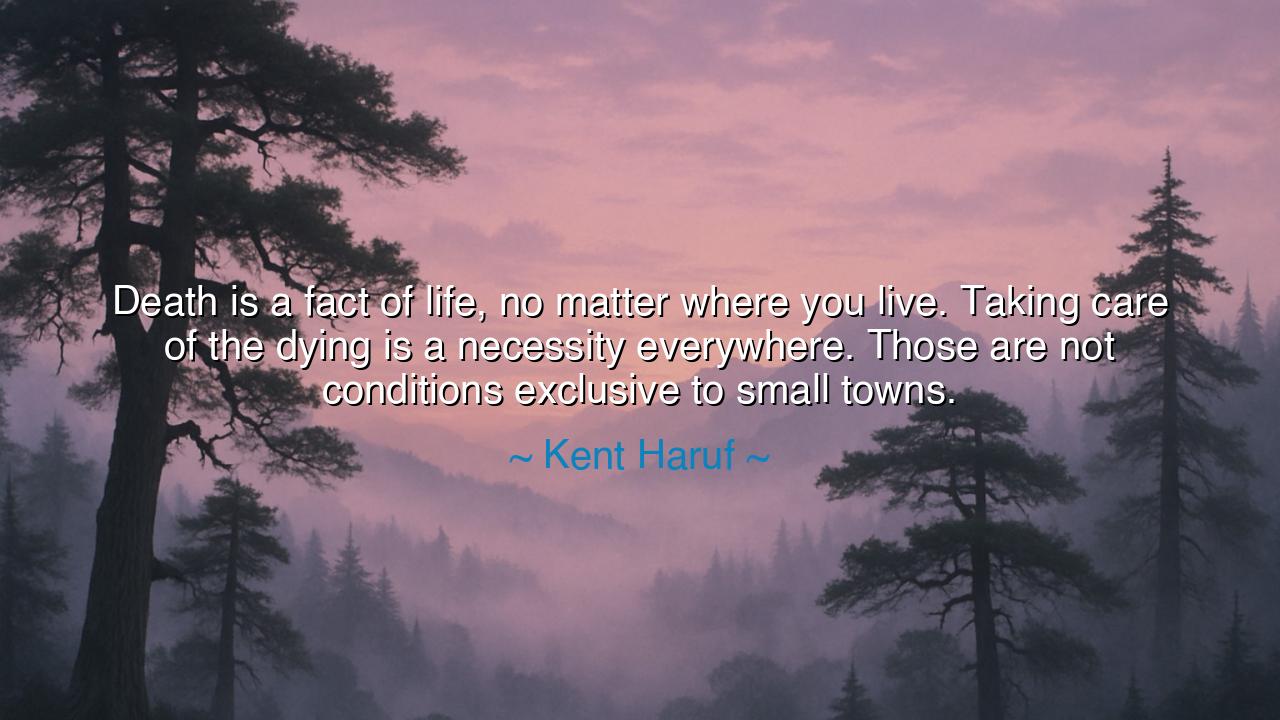
Death is a fact of life, no matter where you live. Taking care of
Death is a fact of life, no matter where you live. Taking care of the dying is a necessity everywhere. Those are not conditions exclusive to small towns.






“Death is a fact of life, no matter where you live. Taking care of the dying is a necessity everywhere. Those are not conditions exclusive to small towns.” — thus spoke Kent Haruf, the quiet chronicler of American plains and simple souls, whose words carry the timeless wisdom of those who have looked closely at the ordinary and found within it the sacred. In this statement, he reminds us of a truth as old as the first sunrise: that death is not a tragedy reserved for some places or some people — it is the universal inheritance of all humanity. And yet, within that inevitability lies a sacred duty: to care for the dying, to stand beside one another at the edge of life’s great mystery with compassion and courage.
Haruf’s words arise from his deep understanding of human life as it unfolds in quiet places. He wrote of small towns, but what he revealed was the beating heart of all existence — the truth that what binds us together is greater than what divides us. The farmer on the plains, the banker in the city, the mother in the mountains, the laborer by the sea — all are touched by the same fate. Death visits every doorstep, and thus, the work of mercy — the care of the suffering and the dying — belongs to every community, large or small. To forget this is to forget our shared humanity.
The ancients, too, knew this truth well. They saw death not as a distant enemy, but as a teacher — the companion that walked beside every living thing, reminding it to live rightly. In the temples of Egypt, the priests whispered, “To learn to die is to learn to live.” In the philosophies of Greece, men like Socrates spoke of death as a release of the soul, to be met with dignity, not despair. And in the East, the sages of India and China taught that life and death are not opposites, but partners in the great dance of existence. Kent Haruf, in his plain-spoken wisdom, carries this same torch: he reminds us that no progress, no wealth, no city’s size can free us from this rhythm — and therefore, our task is not to escape death, but to meet it humanely, and to care for one another along the way.
There is a story told of Florence Nightingale, who, amidst the filth and horror of war, brought tenderness to the dying soldiers of the Crimean front. She could not save them all — death was a fact she could not deny — but she could offer care, and through that care, restore dignity to the dying. In her candlelight and compassion, we see the living expression of Haruf’s message. For to “take care of the dying,” as he says, is not merely to tend to the body, but to honor the spirit, to recognize that love still matters even at the threshold of death. That is not the duty of small towns alone; it is the work of every soul that claims to be human.
In Haruf’s novels, death is never sensational — it is quiet, woven into the fabric of daily life. The people of Holt, Colorado, his fictional town, do not hide from it; they face it with humility, with prayer, and with neighborly kindness. This is what makes his wisdom so powerful: he strips death of its mystery and reminds us that it is not separate from life, but woven through it like shadow through light. Every goodbye, every season’s turning, every birth, and every grief is part of the same pattern — and to care for the dying is to honor that pattern.
Yet beneath his gentle tone lies a moral command. Haruf tells us that indifference is a sin against life itself. In cities, where the noise and haste can dull the senses, many forget that death still dwells there, too — in hospitals, in lonely apartments, in quiet corners where suffering hides. To take care of the dying is to remember that every person’s end deserves tenderness. It is a call to compassion, not just for those at the edge of life, but for those still walking within it. For if we can face death with love, we can also face life with greater peace.
Therefore, my children of tomorrow, take this lesson to heart: do not turn your eyes away from death, for in acknowledging it, you will learn the value of every moment. When someone near you suffers, do not flee in fear or awkwardness; draw close. Offer your hand, your listening, your presence. Do not wait for a “small town” to teach you humanity — carry it with you wherever you live. Remember that every life, no matter how brief, deserves dignity, and every death, no matter how quiet, deserves reverence. As Kent Haruf reminds us, death is not the end of beauty, but the final chance to love deeply. Let us not waste it.






AAdministratorAdministrator
Welcome, honored guests. Please leave a comment, we will respond soon